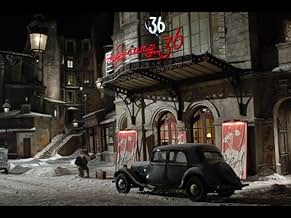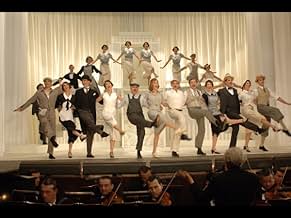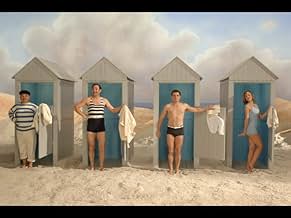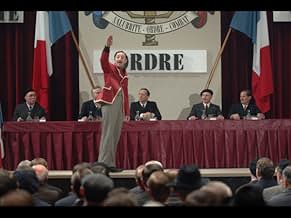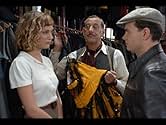When Chansonia, a nightclub, is shut down by the landlord, the stage manager Pigoil is forced to look for a new job. He finds hope when he discovers a young woman with a lovely singing voice... Read allWhen Chansonia, a nightclub, is shut down by the landlord, the stage manager Pigoil is forced to look for a new job. He finds hope when he discovers a young woman with a lovely singing voice.When Chansonia, a nightclub, is shut down by the landlord, the stage manager Pigoil is forced to look for a new job. He finds hope when he discovers a young woman with a lovely singing voice.
- Nominated for 1 Oscar
- 3 wins & 7 nominations total
Featured reviews
Nora Arnezeder reminds me of movie stars of the thirties : beautiful, charming, she can sing, dance, act... Star quality ! As for the film itself, the story is rather simple, which I come to realize, is often what makes it good. It's not so much what the story is about but rather how you tell it. And in that case, you get to laugh, cry, you care about that Pigoil who looses his job, his wife and even his son and who doesn't lose hope, about Milou and Douce's love story. You'll love the great new songs, the homage to Busby Berkeley, Jacky's lousy jokes (a reprise of Kad's own TV skit) and secondary characters played by first-rate comedians like François Morel and the great Pierre Richard. What's not to like ?
I may have seen one of the last musical hall revivals in London a few years ago on The Strand—it was full of tinny song and dance that made you tap your feet and long for the good old days of vaudeville and innocence. The telly has pretty much killed that simple pleasure, but Paris 36, a melodramatic story of the revival of a Chansonia in northern Paris, 1936, revives the joy of ensemble acting and dancing, original music, and the intrigue so much a part of the lively arts when they become business and pleasure.
Three Parisians undertake saving a music hall in their section of Paris called Faubourg using the talents of a star-crossed couple supplying the on and off stage romance. The intrigue is much less than Cabaret's; the nostalgia is more than Cinema Paradiso's; it's all more Moulin Rouge than Amelie. The songs are fetching, made especially for the film, and the plot is pure cliché right down to the lecherous businessman and cute ingénue.
The background is unmistakably fascist versus socialist, owners battling workers for a depression-era slim slice of the economic pie and soul. Paris 36 risks it all with formulaic intrigue and predictable denouement. Yet throughout is a good cheer, a bel canto breeziness that draws you in to song, dance, history, and politics, never too heavy, light enough to make you wish that music hall still stood on The Strand.
Three Parisians undertake saving a music hall in their section of Paris called Faubourg using the talents of a star-crossed couple supplying the on and off stage romance. The intrigue is much less than Cabaret's; the nostalgia is more than Cinema Paradiso's; it's all more Moulin Rouge than Amelie. The songs are fetching, made especially for the film, and the plot is pure cliché right down to the lecherous businessman and cute ingénue.
The background is unmistakably fascist versus socialist, owners battling workers for a depression-era slim slice of the economic pie and soul. Paris 36 risks it all with formulaic intrigue and predictable denouement. Yet throughout is a good cheer, a bel canto breeziness that draws you in to song, dance, history, and politics, never too heavy, light enough to make you wish that music hall still stood on The Strand.
This movie was a surprising little gem. I knew nothing about it and went with some friends yesterday on a whim. It was beautifully photographed and the rendition of 1936 Paris seemed quite authentic. The costumes were exquisite, the story is engaging, and of all the characters were genuine. The scenes in the theater left me smelling the greasepaint
I think this movie captured me because I was once heavily involved in local, amateur theater where we knocked ourselves out putting on shows just for the fun of it. I could identify with these characters struggling to eke out a living and dreaming of fame and success. The contrast of such joyous activities and the hopes of Pigoil, Douce and Jacky, amongst others against those dark times in Europe gives this movie a wonderful, entertaining balance.
It is well worth seeing.
I think this movie captured me because I was once heavily involved in local, amateur theater where we knocked ourselves out putting on shows just for the fun of it. I could identify with these characters struggling to eke out a living and dreaming of fame and success. The contrast of such joyous activities and the hopes of Pigoil, Douce and Jacky, amongst others against those dark times in Europe gives this movie a wonderful, entertaining balance.
It is well worth seeing.
I loved it! Boz Luhrmann meets Cinema Paradiso in numerous ways. The plot is simple, as others here have already described. But it retains an abundance of charm. The undercurrents of antisemitism and fascism that were persistent in 1936 France are themes rarely seen on screen. Ditto for the Communist workers' movement during the same time. The clashes between these two groups were inevitable, and this film depicts that struggle brilliantly, without preaching to us or hitting us over the head with it. All the acting, singing and dancing are extremely well-done, and the cinematography, while Luhrmann-esquire is engaging. Best of all perhaps is the music. This film is destined to be a classic, and will always be on my favorites list. The only thing I would change is that I would retain the original title. The audience for this film is sophisticated enough to handle it.
Christophe Barratier found box office success in France in 2004 with his cute feel-good story The Chorus/Les choristes, which was about how a new music teacher brought humanity to a rural French reform school just after WWII by starting a boys' chorus. This also made newcomer Jean-Baptiste Maunier into a French teen icon. Faaubourg 36 is a glitzier, more musical (as in song-and-dance), more nostalgic period drama meant to evoke French films of the Thirties through its focus on a little working class Paris music hall called Chansonia. As the film opens, financial problems lead a mean magnate called Galapiat (Bernard-Pierre Donnadieu) to shut Chansonia down. But it's 1936, and in the spirit of socialist fervor (and universal labor-management strife) signaled by the rise of Leon Blum's Popular Front, the employees decide to take over Chansonia and run it themselves, on no money. This effort is spearheaded by the stage manager Germain Pigoil (Gerard Jugnot). Pigoil's life has filled with heartbreak. His dancer wife Viviane (Elisabeth Vitali) has left him and the state has chosen to take away his beloved accordionist son Jojo (Maxence Perrin) and send him to live with Viviane.
Trying to create triumph out of adversity, Pigoil designates an awkward song-and-dance guy called Jacky Jacquet (Kad Merad) and a militant (and Jewish) leftist called Emile "Milou" Leibovich (Clovis Cornillac) to reopen the shuttered musical theater in uneasy cooperation with Galapiat. The show must go on! This seems a feeble prospect without financial backing, till the three men get lucky when a young newcomer nicknamed Douce (Nora Arnezedzer) turns up at tryouts. She's talented, pretty, and clearly a crowd-pleaser capable of selling tickets and keeping the place going. Her presence provides further insurance when the local boss turns out to like her.
The ups and downs of the plot include depiction of the pervasive anti-Semitism of the extreme Right and the exacerbated hostilities between labor and ownership. There are little tragedies, but everything is softened and ends happily. Seekers of cinematic edge should look elsewhere. I found it hard to engage with the story, because it's too derivative, stereotypical, and diffuse. Production values are excellent and the music hall performances, if sometimes borderline cringe-worthy, carry through the period flavor. And there are some catchy tunes and sprightly stage turns as well.
I saw this film when it was screened last summer at Saul Zaentz Studios in Berkeley by Tom Luddy, Co-Director of the Telluride Film Festival and the consensus of those then present seemed to be that 'Paris 36' (which has been picked up by Sony Pictures Classics) wasn't interesting or unusual enough to show at Telluride.
But 'Paris 36' seems likely to do well with the more general US subtitles-film audience, and makes perfect sense as the "gala opening film" for the FSLC-UniFrance co-sponsored Rendez-Vous with French Cinema--though in my opinion last year's first night presentation, Claude Lelouch's 'Roman de Gare,' made a much more interesting opener.
Trying to create triumph out of adversity, Pigoil designates an awkward song-and-dance guy called Jacky Jacquet (Kad Merad) and a militant (and Jewish) leftist called Emile "Milou" Leibovich (Clovis Cornillac) to reopen the shuttered musical theater in uneasy cooperation with Galapiat. The show must go on! This seems a feeble prospect without financial backing, till the three men get lucky when a young newcomer nicknamed Douce (Nora Arnezedzer) turns up at tryouts. She's talented, pretty, and clearly a crowd-pleaser capable of selling tickets and keeping the place going. Her presence provides further insurance when the local boss turns out to like her.
The ups and downs of the plot include depiction of the pervasive anti-Semitism of the extreme Right and the exacerbated hostilities between labor and ownership. There are little tragedies, but everything is softened and ends happily. Seekers of cinematic edge should look elsewhere. I found it hard to engage with the story, because it's too derivative, stereotypical, and diffuse. Production values are excellent and the music hall performances, if sometimes borderline cringe-worthy, carry through the period flavor. And there are some catchy tunes and sprightly stage turns as well.
I saw this film when it was screened last summer at Saul Zaentz Studios in Berkeley by Tom Luddy, Co-Director of the Telluride Film Festival and the consensus of those then present seemed to be that 'Paris 36' (which has been picked up by Sony Pictures Classics) wasn't interesting or unusual enough to show at Telluride.
But 'Paris 36' seems likely to do well with the more general US subtitles-film audience, and makes perfect sense as the "gala opening film" for the FSLC-UniFrance co-sponsored Rendez-Vous with French Cinema--though in my opinion last year's first night presentation, Claude Lelouch's 'Roman de Gare,' made a much more interesting opener.
Did you know
- TriviaFaubourg is not French for "the district." It is a contraction of "faux bourg", French for "false town" and were used to designate smaller towns attached to larger towns or cities. A lot of these faubourgs were independent cities until they were attached to Paris and lost all independence around during the 17th and 18th century. A new outer wall was later erected around the city. These faubourgs, especially those on the East side, were usually blue collar, with a very active night life.
- GoofsWhen Jacky accidentally turns on the radio while Pigoil is talking to his wife and her new lover, the radio is very loud immediately after Jacky flips the switch. On this type of old tube amplified radio, it would take several seconds for the tubes to heat up and amplify any signal, and the volume would go up very slowly.
- ConnectionsFeatured in The 82nd Annual Academy Awards (2010)
- How long is Paris 36?Powered by Alexa
Details
- Release date
- Countries of origin
- Official sites
- Language
- Also known as
- Paris 36
- Filming locations
- Surtainville, Manche, France(beach scenes by the end)
- Production companies
- See more company credits at IMDbPro
Box office
- Gross US & Canada
- $851,540
- Opening weekend US & Canada
- $44,690
- Apr 5, 2009
- Gross worldwide
- $12,940,622
- Runtime
- 2h(120 min)
- Color
- Sound mix
- Aspect ratio
- 2.35 : 1
Contribute to this page
Suggest an edit or add missing content





